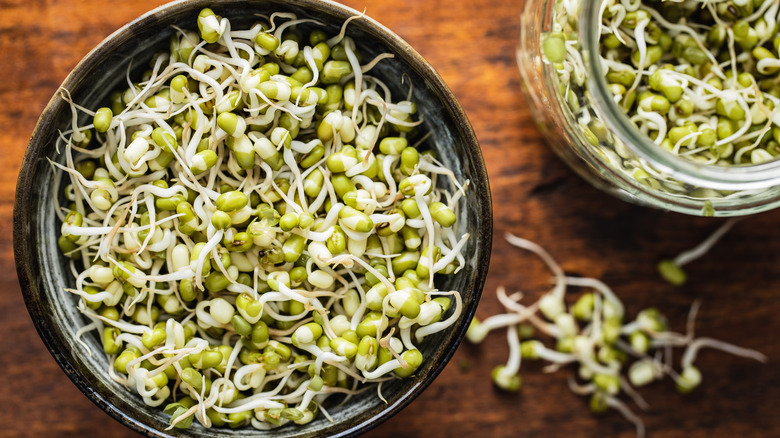The Real Reason You Should Avoid Raw Sprouts At Restaurants
Sprouts are a trendy food item right now. These greens, which are characterized as being young versions of other vegetables, are packed with health benefits. According to Well + Good, sprouts are high in vitamin K, niacin, riboflavin, thiamin, folate, vitamin C, and vitamin A. They also contain minerals like zinc, calcium, manganese, and copper. However, these nutrients don't necessarily mean that everyone should eat this food.
According to Health, sprouts are often grown in warm, moist environments. This type of environment makes them a perfect breeding ground for bacteria. Recent outbreaks of E. coli and Salmonella may be connected to these greens. These risks can be avoided by properly storing and cleaning sprouts, but you don't see that process when you are ordering food from a restaurant. To play it safe, you should probably avoid this food the next time you eat out unless you really trust the establishment. Anyone who is highly susceptible to illness should avoid sprouts completely.
Other foods to avoid at restaurants
According to Eat This, Not That!, there are quite a few foods you should avoid when eating out. Drink garnishes, like citrus fruits, are often unwashed and can sit out on the counter for days before being used. This puts them at a high risk of developing bacteria that can be transferred to you. Raw oysters are also highly likely to be contaminated with foodborne illnesses. Even at the best seafood restaurants, oysters have been found to carry Norovirus and Vibrio. Cooked oysters are much safer to eat.
Another bacteria hot spot? Raw flour. Avoid restaurants that serve raw dough in any capacity, as this is usually made with raw flour unless stated otherwise. Raw flour has been connected to E.coli in the past and can make you very sick. Flour needs to be baked or treated if the final product, like cookie or pizza dough, is not going to be cooked before being eaten or handled.


